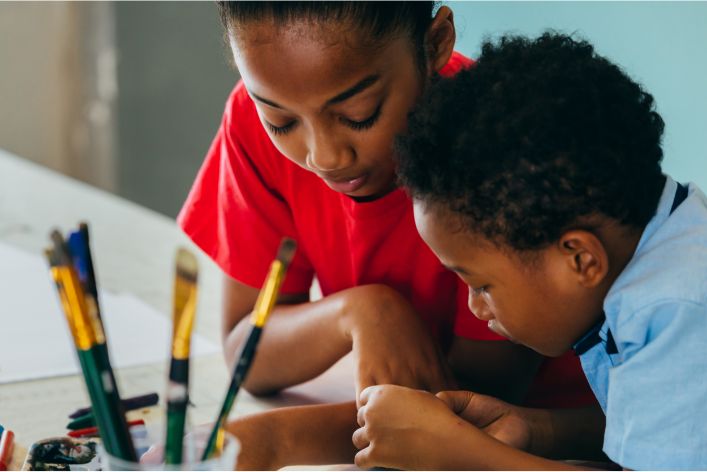Introduction
Raising future leaders is of utmost importance in ensuring the continued growth and development of any society. It is well established that childhood experiences and upbringing play a significant role in the development of leadership skills.
In the Nigerian context, factors such as culture, economics, and political climate all influence child growth and development. Understanding these factors is crucial in raising future leaders who are equipped to lead and make a positive impact in their communities.
With this in mind, this blog section will provide insights into the Nigerian child growth experience and explore ways in which parents, educators, and society at large can ensure that children grow up to be effective leaders.
Child Development in Nigeria
Child development in Nigeria is influenced by various factors, including socioeconomic status, access to healthcare and education. These factors play a crucial role in shaping a child’s growth and development.
Different Stages of Child Growth in Nigeria
Infants in Nigeria typically undergo various stages of growth and development. During the first year, they learn to sit, crawl, stand, walk, and even say their first words.
Toddlers, on the other hand, begin to understand language better and develop their motor skills further.
Nigerian children also reach many milestones, both physical and cognitive, during their development. At around 6 months, infants can typically roll over, sit up and even pick up small objects.
By the age of 2, toddlers can usually walk, run, jump and climb stairs with ease. Cognitive milestones include being able to recognize familiar faces and voices, point to objects when asked, and understand simple instructions.
Factors that Influence Child Development in Nigeria
However, not all children in Nigeria have access to the same resources to facilitate their growth and development. Socio-economic status plays a significant role in determining the kind of opportunities afforded to children.
Children from affluent families typically have better access to healthcare, quality education and resources like toys, books and other learning materials, all of which can significantly impact their development.
On the other hand, children from economically disadvantaged backgrounds may not have access to the same resources. Lack of proper nutrition, healthcare and education can significantly impact their growth and development.
Additionally, children who live in areas prone to violence and conflict may also experience trauma, which can impact their emotional and cognitive development.
Access to quality healthcare is essential for Nigerian children’s growth and development. Proper vaccinations, regular check-ups, and early interventions when necessary can help prevent and address any health issues that may arise.
Education also plays a vital role in children’s growth and development. Enrollment in quality early childhood education programs can significantly impact a child’s cognitive development and lay a strong foundation for their future academic success.
In essence, understanding the different stages of child growth and development in Nigeria is essential in raising future leaders. The factors that influence children’s development and the milestones they reach can help parents, caregivers, and educators ensure they have the resources and knowledge necessary to support their growth and development.
Parenting Made Just for You
Get personalized Parenting Solutions tailored to your child’s needs. Transform your parenting journey with expert guidance in 1-3 days.
Get StartedBy addressing issues related to socio-economic status, access to healthcare and education, we can help ensure all Nigerian children have an equal opportunity to reach their full potential.
Read: Nigeria’s Early Childhood Development: An Overview
Nigerian Parenting Styles
Nigeria, like many African countries, puts a high value on personal and professional success, making it important for parents to instill leadership skills in their children.
Overview of Common Parenting Styles in Nigeria
Parenting styles vary, but can generally be divided into four main types:
- Authoritarian: Also known as strict parenting, this style involves imposing harsh rules and expecting strict obedience, often without explanation. Parents who use this style may rely on punishment rather than positive reinforcement.
- Permissive: Permissive parenting is characterized by low control and high responsiveness. Parents who use this style avoid confrontation and give their children a lot of freedom, often to the point of neglect.
- Authoritative: Authoritative parenting is a balance between strictness and flexibility. Parents who use this style set clear rules and expectations, but also explain the reasoning behind them. They provide affection and support in addition to discipline.
- Uninvolved: This style is characterized by low levels of control and responsiveness. Parents who use this style are generally uninvolved with their children’s lives and do not provide much emotional or financial support.
Each of these parenting styles has an impact on child development and leadership skills. Authoritarian parents may produce obedient children, but they may lack the confidence and critical thinking skills needed to become effective leaders.
Permissive parenting, while allowing children to develop some independence, can lead to poor decision-making skills and a lack of accountability.
Authoritative parenting is generally regarded as the best approach for raising future leaders. Children raised in this style tend to be confident, independent, and able to make informed decisions.
They are also more likely to be responsible and accountable, as they understand the reasoning behind rules and expectations.
Read: Handling Child Misbehavior: A Guide for Nigerian Parents
Best Practices for Parenting Future Leaders in Nigeria
Best practices for parenting future leaders in Nigeria include:
- Setting high expectations: Parents should set high but realistic expectations for their children. Encouraging them to aim for success helps to build confidence and a strong work ethic.
- Teaching critical thinking skills: Parents should encourage their children to think critically and independently. This involves asking questions and providing opportunities for them to make decisions on their own.
- Providing a safe and supportive environment: Children need a safe and supportive environment to thrive. Parents should provide emotional support, praise, and encouragement to help build their self-esteem.
- Encouraging communication: Communication is key to building a strong relationship between parents and children. Parents should encourage open communication and provide opportunities for their children to express themselves.
- Leading by example: Children learn by watching and imitating their parents. Parents should model good behavior and values, such as honesty, hard work, and respect.
Impact of Parenting Styles on Child Development and Leadership Skills
Therefore, parenting styles have a significant impact on child development and leadership skills. Authoritative parenting is generally regarded as the best approach for raising future leaders.
By setting high expectations, teaching critical thinking skills, providing a safe and supportive environment, encouraging communication, and leading by example, parents can help their children become confident, independent, and responsible leaders.
Read: Cultural Impact on Child Development in Nigeria

Educational Opportunities in Nigeria: Challenges and Importance in Raising Future Leaders
Nigeria, a country with a population of over 200 million people, known for its large oil reserves and diverse culture, holds immense opportunities for education.
Unveil the Perfect Name that Tells Your Family's Story
Let us help you find a name that embodies your family's values, traditions, and dreams. Our personalized consultation weaves cultural insights to create a name that's uniquely yours.
Get StartedNevertheless, there are still challenges affecting the quality of education and its impact on the development of leadership skills among Nigerian children.
Challenges and Opportunities for Education in Nigeria
- The inadequate educational infrastructures including poor funding, insufficient learning materials, and unqualified teachers, causing a shortage of educational opportunities, and resulting in low literacy rates.
- The inequality in access to education among Nigerian children, with the less privileged and rural areas bearing the brunt of it.
- The increasing level of insecurity in the country, which has led to the closure of schools in some parts of the country, thereby limiting children’s access to education.
- The proliferation of low-quality private schools that cannot compete with standard government, and public schools.
Despite these challenges, there is a ray of hope regarding the educational opportunities that Nigeria offers, especially in preparing future leaders that the country needs.
Importance of Education in Raising Future Leaders
An excellent educational system plays a vital role in preparing children to become future leaders. It instills discipline, ethical behavior, critical thinking, and creativity required for leadership.
Education also equips children with the necessary skills to pursue different career paths and contribute to the country’s economic growth and development.
Furthermore, education opens doors to social mobility, enabling children to come from disadvantaged backgrounds to rise to positions of power and influence, steering Nigeria towards prosperity.
Types of Education Available in Nigeria and How They Impact Leadership Skills Development
- Formal Education: This is the most common type of education in Nigeria, and it encompasses primary, secondary, and tertiary education. Formal education provides children with basic knowledge and skills required for leadership and personal development.
- Informal Education: This involves learning outside formal classrooms, which happens mainly at home, religious institutions, and community centers. Informal education structures children’s value systems, ethics, and morals, which are important for leadership development.
- Vocational Education: This is another type of education that focuses on providing practical skills, knowledge, and competency required for a specific trade or profession. Vocational education develops technical and entrepreneurial skills, preparing children for leadership roles in their chosen fields.
- Adult Education: This is targeted at adults who missed out on formal education and need to acquire educational skills to participate effectively in society. Adult education equips adults with the essential knowledge and skills required for career advancement and leadership positions.
Basically, education provides Nigerian children with the opportunities and tools required to become effective and visionary leaders. A good educational system is, therefore, a critical aspect of leadership development in Nigeria.
It is essential to provide equal and quality educational opportunities that will prepare Nigerian children for the challenges of leadership. This can be achieved through proper funding, qualified teachers, and access to educational resources, among other measures.
Nigeria can harness the full potential of its young population and develop its future leaders by investing heavily in education. This will create a trickle-down effect that will positively impact the country’s economy, social and political sectors.
Read: Expectations vs Reality: Child Milestones in Nigeria
Conclusion
Raising future leaders is crucial for the development and progress of any nation. As parents in Nigeria, it is essential to understand the growth and development of our children and how it affects their leadership potential.
Key takeaways include the importance of providing a nurturing environment for children to thrive, instilling values such as honesty, integrity, and responsibility, and fostering independence and critical thinking skills.
Furthermore, it is vital to recognize and cultivate a child’s natural talents and interests, encourage them to take on leadership roles and expose them to diverse experiences and perspectives.
As parents, we must also prioritize education and continuous learning, both for ourselves and our children. By instilling a love of learning and encouraging curiosity, we equip our children with the tools they need to become effective leaders and make positive contributions to society.
Lastly, I urge all parents in Nigeria to focus on raising future leaders in their children. Let us lead by example, nurture their potential, and provide them with the resources and support they need to succeed. Together, we can build a better future for our children and our nation.




